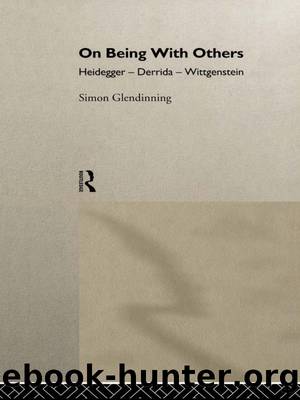On Being with Others by Glendinning Simon;

Author:Glendinning, Simon; [SIMON GLENDINNING]
Language: eng
Format: epub
Publisher: Routledge
Published: 2011-10-18T00:00:00+00:00
Closing philosophy
There are many fascinating continuities between Wittgensteinâs early and late philosophies.12 However, in my view Wittgensteinâs later approach involves a special kind of break from both his early work and âmetaphysicsâ in general. It is on the nature of this break that we can see a clear and deep correspondence between the thought of the later Wittgenstein and Derrida.
The most salient contrast to previous philosophy lies in their common refusal to accept that their work marks the âapocalypticâ end of philosophy in the sense of a final completion or âonce and for allâ achievement of a state of complete clarity that stands in need of no further (essential) supplementation (PI, §§91â2, §§132â3; Z, §447; cp. TLP, p. 4; Derrida, 1993, pp. 144â6). Moreover, both name the attempt to achieve such complete clarity âphilosophyâ. Of course, it is not in the least peculiar to either Wittgenstein or Derrida to write of, and hence in some sense to write beyond, a tradition they are willing to call simply âphilosophyâ. Indeed, no philosophy can really do otherwise. However, it is a recurrent feature of the history of philosophy that ânewâ modes of thought (new âsignaturesâ: Aristotelian, Cartesian, Humean, Kantian, Hegelian, Fregean, etc.) have always positioned themselves in some way in a relation of final mastery over those discourses they claim to supersede.13 With each new stage in the history of philosophy a new claim is made to have found a way of achieving complete clarity which brings philosophy to an end.
It is precisely in this respect that the kind of approach pursued by both Wittgenstein and Derrida constitutes a new âkinkâ in the history of philosophy which separates their writing from previous Western thought.14 In contrast to the classical âdiscourses of the endâ, the writings of Derrida and Wittgenstein effect what might be called a âclosureâ of a tradition. Closure does not aim to bring a tradition or âhistorical totalityâ to an end by fulfilling its aims. Indeed, it resists the assumption that it can ever âendâ in that sense. Rather, it aims to identify the basic structural figure which characterises the tradition as such.15 In the sketch of Derridaâs reading of the âhistory of (the only) metaphysicsâ outlined above, this figure was identified with the ideal of exactness. In what follows I aim to show that Wittgensteinâs later work has precisely the same basic target in view. It is this ideal which sustains the assumption that âthe worldâ has a unitary essence about which we might become completely clear, and hence sustains âphilosophyâas a discourse of the end.
Download
This site does not store any files on its server. We only index and link to content provided by other sites. Please contact the content providers to delete copyright contents if any and email us, we'll remove relevant links or contents immediately.
The Art of Thinking Clearly by Rolf Dobelli(10455)
Mindhunter: Inside the FBI's Elite Serial Crime Unit by John E. Douglas & Mark Olshaker(9324)
Change Your Questions, Change Your Life by Marilee Adams(7760)
Nudge - Improving Decisions about Health, Wealth, and Happiness by Thaler Sunstein(7693)
Mastermind: How to Think Like Sherlock Holmes by Maria Konnikova(7323)
The Power of Now: A Guide to Spiritual Enlightenment by Eckhart Tolle(5758)
Men In Love by Nancy Friday(5234)
Altered Sensations by David Pantalony(5094)
Factfulness: Ten Reasons We're Wrong About the World – and Why Things Are Better Than You Think by Hans Rosling(4736)
The Confidence Code by Katty Kay(4251)
Thinking in Bets by Annie Duke(4218)
Man and His Symbols by Carl Gustav Jung(4131)
The Worm at the Core by Sheldon Solomon(3486)
Why Buddhism is True by Robert Wright(3446)
Liar's Poker by Michael Lewis(3441)
Three Women by Lisa Taddeo(3424)
The Inner Life of Animals by Peter Wohlleben(3311)
Descartes' Error by Antonio Damasio(3271)
How Music Works by David Byrne(3260)
